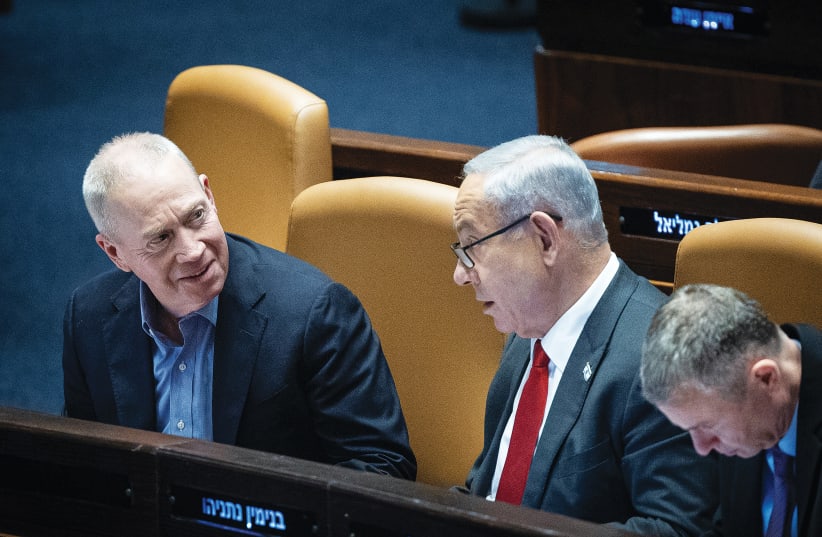Two weeks and a day after announcing that he would fire Defense Minister Yoav Gallant, Prime Minister Benjamin Netanyahu convened a special press conference this week to proclaim that he actually wouldn’t.
In the interim, all hell broke loose, starting with a spontaneous outburst of mass protests against Gallant’s dismissal, which precipitated a dramatic last-minute freeze on the government’s judicial overhaul, and culminating in the most dangerous security challenge the country has faced in many years.
For 15 days, Netanyahu kept his defense minister dangling in the air, demanding public apologies and pledges of allegiance as preconditions for Gallant to keep his post. Even when the security escalation was already in progress, the premier merely announced a “suspension” of the dismissal, effectively leaving Gallant on probation. But given that the multifront terrorist attacks over the Passover holiday tragically fulfilled the defense minister’s public warning of a “clear, immediate, and tangible threat” that mandates a delay in the divisive judicial blitz – which prompted his dismissal in the first place – Netanyahu had no choice but to backtrack, abandon his preconditions and tell the public that the defense minister would remain in his post.
“Regarding the minister of defense,” Netanyahu said as he casually announced Gallant’s fate on Monday evening, burying the headline at the end of his speech, only after trying to placate his political base with a traditional pack of distortions, slanders and disclaimers. The prime minister accused the previous government, the opposition and IDF reservist refuseniks of emboldening Israel’s enemies and shattering its deterrence. Just as typically, Netanyahu took no responsibility whatsoever for the deep internal and external crises his government has precipitated in just 100 days.
The prime minister didn’t even inform Gallant in advance about the career announcement he was about to make, as it would serve as a clear acknowledgment he had made a mistake. But two-and-a-half weeks after Gallant raised the alarm to the nation and warned of unprecedented challenges and threats, Netanyahu summoned a press conference to address their realization, admitting, in effect, that the defense minister was right on with every word.
Keeping Gallant was a necessary decision for Netanyahu
Given the shaky security, political and internal situation, the prime minister made the right and necessary decision, mainly in his own political interest. The latest opinion polls reveal that Netanyahu, the Likud and the coalition are collapsing: The prime minister’s approval ratings have plunged to an all-time low of 25%, according to a Channel 2 survey from last weekend, and several polls have projected that if elections were to be held today, the Likud would drop between seven and 12 seats, and the ruling coalition would lose 10-18 seats. On Sunday evening, a Channel 13 poll predicted Netanyahu’s party would sink as low as 20 seats, which convinced Netanyahu to urgently cut his losses and minimize the damage. His U-turn on Gallant’s layoff was mainly an emergency move aimed at stopping the bleeding in the polls, even at the price of accepting his defeat, at least in the first round.
Netanyahu’s decision to fire Gallant, which brought hundreds of thousands of demonstrators to the streets and sparked a nationwide strike, astonished and angered even some of Netanyahu’s biggest supporters and caused tremendous damage to him and the Likud.
MEANWHILE, IN a mirror image of the prime minister’s popularity, which is down to historic lows, Gallant is at the peak of his public career. His decision to come out against the judicial reform, which eventually aborted Netanyahu and Yariv Levin’s plans and directives, turned him into the hero of the day and a symbol for the anti-reform movement. Moreover, the unfortunate realization of the security dangers he warned of positioned him as Mr. Security, the responsible adult who places security above all political considerations, a title that Netanyahu once claimed for himself.
Gallant took a huge risk when he disavowed the Netanyahu-Levin directive and stood up to the dominant forces and enthusiastic spirits in his party who adamantly support the judicial blitz, a risk equated even to political suicide in the current Likud atmosphere. He knew it could cost him his job and shatter his future, but felt obliged by responsibility and conscience to speak out against the rapid changes and their dangerous implications for Israel’s defense, deterrence and resilience. But what initially appeared to be an illogical political move, against Gallant’s own interests, flipped in the opposite direction. He entered the event as another Likud minister and emerged as a leader.
Yoav Gallant: Israel's most trusted minister
Gallant, according to the Channel 2 poll from last weekend, is the only minister in the government with positive approval ratings, with 56% in favor of his conduct. Never – since the 2011 land scandal that thwarted his appointment as IDF chief of staff, through his relatively gray political career in the former Kulanu Party and continuing to the Likud – has the former general been so popular and praised. Even in inner Likud circles, mostly hostile to internal rebellions against their leader, Gallant is still highly appreciated, as was evident in the traditional party Mimouna celebrations this week, where he was warmly welcomed.
The cancellation of Gallant’s dismissal is also a tremendous victory for the mass anti-reform protest movement, which marked a double success: freezing the judicial overhaul legislation, as well as deterring Netanyahu from implementing the dismissal. Netanyahu didn’t mention the legal reform in his speech, nor did he admit he was wrong in firing his defense minister, but his announcement signaled his defeat and a 1-0 victory for Gallant and the protesters in the first round. However, Gallant’s popularity, which saved him his job for now, is likely to boomerang in the future, as it guarantees that Netanyahu will come back to confront him in a second round.
The prime minister indeed says that he has put the disagreements with his defense minister behind him in order to work together to meet the security challenges, but the common Likud notion is that the reversal of his sacking is only temporary.
“Netanyahu needs Gallant now, in order to calm down the political, diplomatic and security fronts, and to restore public trust and recuperate his shattered image. In the long run, once he is stabilized, he will find the opportunity to fire him and mark his revenge.”
Netanyahu confidant
“Netanyahu needs Gallant now, in order to calm down the political, diplomatic and security fronts, and to restore public trust and recuperate his shattered image. In the long run, once he is stabilized, he will find the opportunity to fire him and mark his revenge,” one of Netanyahu’s confidants said this week, assessing that “Gallant will not end the term in his current post.”
Gallant is the latest in a historical chain of security chiefs and generals whose relationships with Netanyahu soured: from Itzik Mordechai to Moshe Ya’alon to Benny Gantz, an overwhelming majority of defense ministers who served under him over the decades experienced a severe confidence crisis which caused a deep rift. Gallant, apparently, will fall under the same spell. But so far, Netanyahu’s decision to confront him has only sharpened his image as a leader and winner. •

